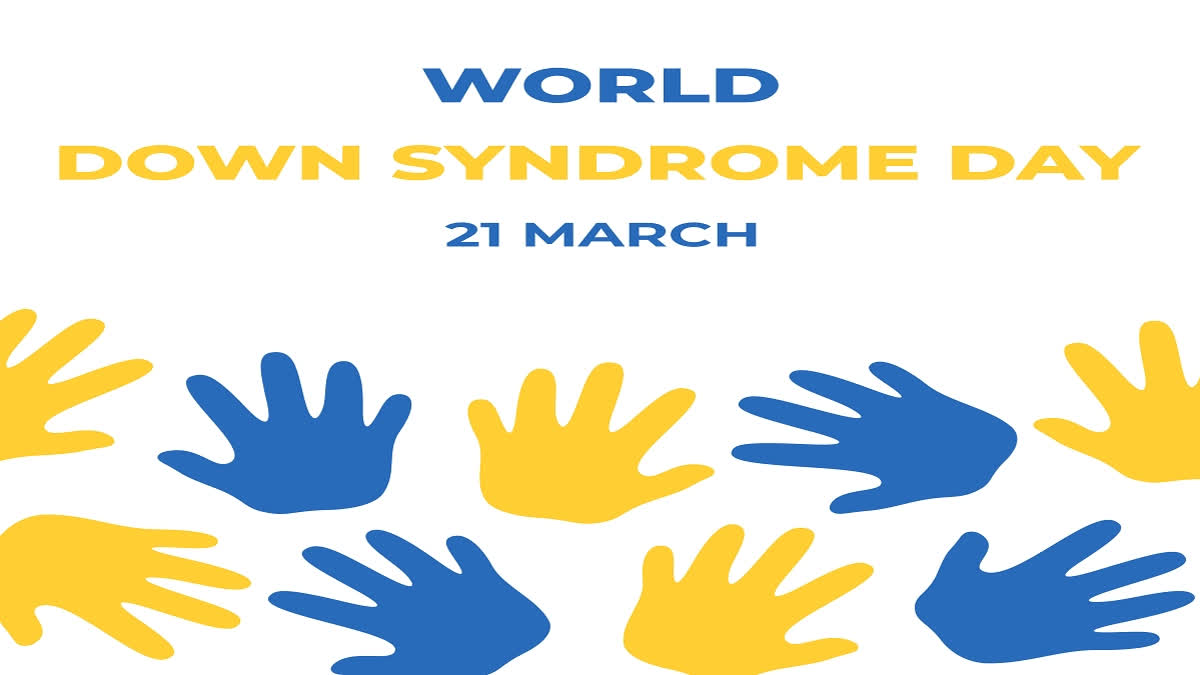Hyderabad: World Down Syndrome Day 2024 is a worldwide event to raise awareness of Down syndrome. It's also a day to acknowledge and celebrate the lives and achievements of people with Down syndrome.
Down syndrome occurs when an individual has an extra partial (or whole) copy of chromosome 21. Down syndrome has always been a part of the human condition. It exists in all regions across the globe and commonly results in variable effects on learning styles, physical characteristics and health.
Adequate access to health care, to early intervention programmes, and to inclusive education, as well as appropriate research, are vital to the growth and development of the individual.
In December 2011, the United Nations General Assembly declared 21 March as World Down Syndrome Day. The General Assembly decided, with effect from 2012, to observe World Down Syndrome Day on 21 March each year.
Theme for World Down Syndrome Day: The theme for World Down Syndrome Day 2024 is 'End the Stereotypes'. This theme aimes to raise awareness about the challenges faced by people with Down syndrome due to misconceptions and prejudices.
The estimated incidence of Down syndrome is between 1 in 1,000 to 1 in 1,100 live births worldwide. Each year, approximately 3,000 to 5,000 children are born with this chromosome disorder. The quality of life of people with Down syndrome can be improved by meeting their health care needs, including regular check-ups with health professionals to monitor mental and physical condition and to provide timely intervention be it physiotherapy, occupational therapy, speech therapy, counselling or special education.
Individuals with Down syndrome can achieve optimal quality of life through parental care and support, medical guidance, and community based support systems like inclusive education at all levels. This facilitates their participation in mainstream society and the fulfillment of their personal potential.
Some common physical features of Down syndrome include:
Each person with Down syndrome is an individual — intellectual and developmental problems may be mild, moderate or severe. Some people are healthy while others have significant health problems like serious heart defects.
Children and adults with Down syndrome have distinct facial features. Though not all people with Down syndrome have the same features, some of the more common features include:
- A flattened face, especially the bridge of the nose
- Almond-shaped eyes that slant up
- A short neck
- Small ears
- Small head
- A tongue that tends to stick out of the mouth
- Tiny white spots on the iris (colored part) of the eye
- Small hands and feet
- A single line across the palm of the hand
- Small pinky fingers that sometimes curve toward the thumb
- Poor muscle tone or loose joints
- Shorter in height as children and adults
- Excessive flexibility
- Tiny white spots on the colored part (iris) of the eye called brushfield's spots
- Short height
Types of Down Syndrome
There are three types of Down syndrome. People often can’t tell the difference between each type without looking at the chromosomes because the physical features and behaviors are similar.
Trisomy 21: About 95 per cent of people with Down syndrome have Trisomy 21.2 With this type of Down syndrome, each cell in the body has three separate copies of chromosome 21 instead of the usual two copies
Translocation Down syndrome: This type accounts for a small percentage of people with Down syndrome (about 3 per cent). This occurs when an extra part or a whole extra chromosome 21 is present, but it is attached or 'trans-located' to a different chromosome rather than being a separate chromosome 21
Mosaic Down syndrome: This type affects about two per cent of the people with Down syndrome. Mosaic means mixture or combination. For children with mosaic Down syndrome, some of their cells have three copies of chromosome 21, but other cells have the typical two copies of chromosome 21. Children with mosaic Down syndrome may have the same features as other children with Down syndrome. However, they may have fewer features of the condition due to the presence of some (or many) cells with a typical number of chromosomes.
Diagnosis
There are two basic types of tests available to detect Down syndrome during pregnancy: screening tests and diagnostic tests. A screening test can tell a woman and her healthcare provider whether her pregnancy has a lower or higher chance of having Down syndrome. Screening tests do not provide an absolute diagnosis, but they are safer for the mother and the developing baby.
Diagnostic tests can typically detect whether or not a baby will have Down syndrome, but they can be more risky for the mother and developing baby. Neither screening nor diagnostic tests can predict the full impact of Down syndrome on a baby; no one can predict this.
Why should World Down Syndrome Day be celebrated?
Promoting Inclusion: It encourages societies to be more inclusive by recognising the inherent dignity, worth, and contributions of individuals with Down syndrome. It promotes a world where everyone is accepted and valued regardless of their abilities
Raising Awareness: Many people still lack understanding about Down syndrome and may hold misconceptions or stereotypes. By celebrating World Down Syndrome Day, we can educate others about the condition, its causes, and how individuals with Down syndrome lead fulfilling lives
Advocating for Rights: Individuals with Down syndrome have the right to education, healthcare, employment, and participation in all aspects of society. By celebrating this day, we advocate for the rights of people with Down syndrome and work towards creating more inclusive policies and environments
Celebrating Diversity: Diversity enriches our societies and contributes to a more vibrant and tolerant world. Celebrating World Down Syndrome Day celebrates the diversity of human experience and challenges the notion of normalcy, promoting acceptance of differences
Supporting Families: Families of individuals with Down syndrome often face unique challenges and require support. World Down Syndrome Day provides an opportunity to acknowledge and support these families, fostering a sense of community and solidarity.
Fostering Empowerment: Celebrating World Down Syndrome Day empowers individuals with Down syndrome by highlighting their abilities, achievements, and potential. It encourages them to pursue their dreams and aspirations without limitations imposed by societal prejudices.
Down Syndrome in India:
India has the highest number of people suffering from Down’s Syndrome in the world. The numbers are alarming but what is more frightening is the fact that this condition is fatal in India due to negligence, lack of awareness and obsolete medical and technological facilities. This congenital condition often comes with congenital heart diseases which can be treated. However, a vast majority of Indian doctors advise against surgery for infants whose body weight is less than 10KG because they are of the opinion that such kids have a slim or poor chance of survival.


